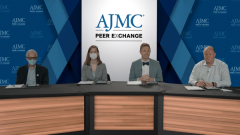
BTKis in the Value-Based Care Models
Roy Beveridge, MD, and Brian Koffman, MD, explore how the Bruton tyrosine kinase inhibitors (BTKi) fit into value-based care models for oncology and the patient support offered to aid patients in gaining access to BTKis.
Episodes in this series

Ryan Haumschild, PharmD, MS, MBA: Dr Beveridge, how do BTKis [Bruton tyrosine kinase inhibitors] fit into a value-based care model for oncology? If you could, discuss your experience with value-based care models in oncology, specifically as it relates to leukemia and lymphoma.
Roy Beveridge, MD: That’s a great question. I’m not sure I’ve got a great answer. My first comment is in terms of the financial toxicity burn that you were talking about. One of the greatest causes of bankruptcy in this country is medical bills, particularly drug bills. That’s not something we should be proud of as a society. You’re correct that the IRA [Inflation Reduction Act of 2022], which physicians need to spend time understanding, makes a fundamental impact. In 2026, [Medicare] Part D switches over. The legislation says is that the total maximum out-of-pocket cost for a patient is $2000 in Medicare. A lot of this financial toxicity from a drug standpoint will be alleviated at that point. But there’s a corollary problem with IRA in terms of financial toxicity, and that’s the savings to the patient as the payers carrying more risk for drug expenditure. The insurers are taking on a greater proportion of risk when we’re talking about what’s going to happen in 2026 and ’28, which suggests that they’re going to be spending more time thinking about tiering products and how to deal with these expensive drugs, like we’re talking about. One could flippantly say, it will be easier with the $2000, but it’s going to be more complicated than that for this drug class.
Ryan Haumschild, PharmD, MS, MBA: Dr Koffman, from the patient’s perspective, what patient support is offered to aid patients to gain access to BTK [Bruton tyrosine kinase] inhibitors? There are patient-support foundations, and there are sponsored programs from the manufacturers. What does that look like for a patient? How do they navigate that area?
Brian Koffman, MD: Our motto at CLL Society is, “Smart patients get smart care.” That’s not necessarily about getting the right treatment. That’s about getting your treatment paid for; that’s critical. That treatment may not even be a drug. Can you get paid to go into a clinical trial? Because it can be difficult to get insurance to cover that. There are always expenses associated with this, so the patient has to be sophisticated. On our website at cllsociety.org, we have a list of financial resources. To their credit, most of the pharmaceutical companies have great programs, and they’re usually not means tested. If you’re uninsured, they often really help you. If you have commercial insurance, they often really help you. Co-pays could be $10 or $20 for a medicine that costs over $10,000 for the month. These programs are there for these patients, but you have to know about them. They’re generally easy to apply for. They go out of their way to make it relatively easy, but you’ve got to be on the internet, and you’ve got to know about these—you’ve got to ask about it.
For Medicare patients, it’s another issue because any funding to help them is means tested, so a lot of patients won’t qualify. A lot of times that money dries up. You also have to know where to look for that, and sometimes you’ve got to move fast. To its credit, the Leukemia & Lymphoma Society often helps patients in that regard, but they have a bucket of money. It can be gone in a month [or even] a day—depending on how many patients are aware of it—or you may not qualify. There are broader general charities that try to help patients, but that’s an even more difficult pitch to get that. There are ones that specifically help with the drugs, and there are ones that help with other medical expenses. We try to list all those resources on our website, but I’m taking care of not only my leukemia but also how to pay for my drugs from my leukemia. It’s a second job, and sometimes it’s bigger than the other job. I went out of state to clinical trials. Without a nurse navigator helping me, [it’s hard] as a physician or as a patient to navigate and try to get my insurance to pay—they didn’t have that trial in my state, and I’m legally allowed to get on this trial. It was a huge effort. Without a professional nurse navigator on the inside helping me, there’s no way I could have enrolled in the clinical trials.
Roy Beveridge, MD: Remember, these are all Part D drugs, orals. Every person in Medicare has to buy a separate Part D plan unless they’re getting Part C, which is Medicare advantage. Those entities are going to have increasing tightness in terms of their budgets with what we’ve just talked about. We have to think progressively more about the tiering and the choices that the Medicare drug plans are going to have to choose to cover their population. It goes back to the discussion of real-world evidence —what works better in older patients around the value stuff and how we’re going to deal with wonderful drugs. Maybe we’re going have to choose 1 or 2 in a class as opposed to all 3.
Transcript edited for clarity.
Newsletter
Stay ahead of policy, cost, and value—subscribe to AJMC for expert insights at the intersection of clinical care and health economics.










